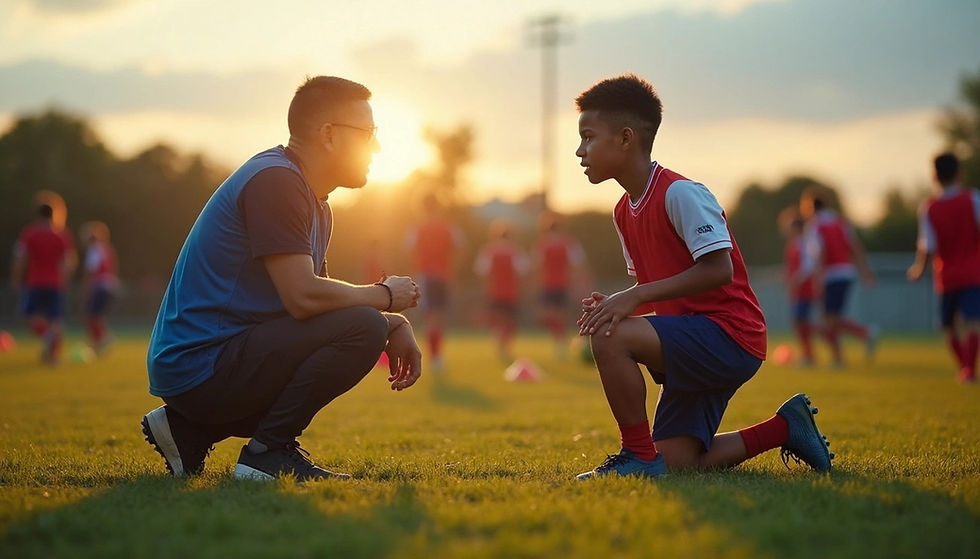How to Manage Stress in Athletes: Effective Coping Strategies
- Dr Paul McCarthy

- Aug 9, 2025
- 7 min read

Introduction
The pressure to perform, the fear of failure, and the constant physical demands make sports a breeding ground for stress. Research reveals that approximately 91% of athletes experience some level of stress related to their sports participation. Whether you’re a professional athlete, a weekend warrior, or a coach guiding others, understanding how to manage stress in sports is crucial for both performance and wellbeing.
This comprehensive guide explores the nature of stress in athletes, its impact on performance, and most importantly, provides practical, evidence-based strategies for effectively coping with athletic stress. By implementing these techniques, you can transform stress from a performance barrier into a potential catalyst for growth and achievement.
Understanding the Sources of Athlete Stress
Athlete stress manifests differently depending on the sport, competitive level, and individual personality factors. Before developing effective coping mechanisms, it’s essential to identify the common sources of stress in sports.
External Stressors
Athletes face numerous external pressures that contribute significantly to their stress levels:
Competitive Pressure: The inherent pressure to win and perform at peak levels
Audience Expectations: Pressure from fans, family members, and sponsors
Media Scrutiny: Particularly for high-profile athletes, constant media attention can amplify stress
Environmental Factors: Unfamiliar competition venues, weather conditions, or travel demands
Research shows that stress in athletes can significantly impact both performance and overall well-being, with these external factors often being the most visible sources of pressure.
Internal Stressors
While external pressures receive more attention, internal stressors often have an equally significant impact:
Self-Imposed Pressure: Studies indicate that 66.5% of athletes report experiencing self-imposed pressure as a primary stressor
Fear of Failure: 64% of athletes identify fear of failure as a major source of stress
Identity Concerns: Many athletes strongly tie their self-worth to their athletic performance
Perfectionism: The pursuit of flawless performance can create unsustainable pressure
Understanding the unique patterns of stress in athletes is essential for developing effective interventions that address both external and internal pressure sources.
How Stress Impacts Athletic Performance
The relationship between stress and performance is complex and highly individualized. Research on athletic performance under stress reveals:
Negative Impacts: 25.5% of athletes report that stress negatively affects their performance through decreased concentration, impaired decision-making, and physical tension
Positive Effects: Interestingly, 34% indicate that some stress actually enhances their performance by increasing focus and motivation
Mixed Responses: The remaining athletes experience variable effects depending on the situation and stress level
This variability highlights why personalized approaches to stress management are crucial. What works for one athlete may be ineffective or even counterproductive for another.
The Stress-Performance Relationship
The relationship between stress and performance typically follows an inverted U-shaped curve (known as the Yerkes-Dodson law):
Too little stress: Results in underarousal and suboptimal performance
Optimal stress: Creates the ideal state of arousal for peak performance
Too much stress: Leads to overarousal and performance deterioration
Managing athlete stress effectively requires a multidisciplinary approach involving coaches, psychologists, and the athletes themselves to find this optimal balance.
Effective Coping Strategies for Athletes Under Pressure
Developing personalized coping strategies for athletes should be a priority in any comprehensive training program. Based on sports psychology research, here are evidence-based approaches that have proven effective:
Mental Skills Training
The most effective coping strategies for athletes combine both mental and physical techniques:
1. Mindfulness and Present-Moment Focus
Implementing mindfulness techniques for athletes coping with stress can improve focus and reduce anxiety before competition. This practice involves:
Developing awareness of thoughts and feelings without judgment
Focusing attention on the present moment rather than past mistakes or future concerns
Regular practice of mindfulness meditation (5-10 minutes daily)
A study of Olympic athletes found that mindfulness training significantly reduced competitive anxiety and improved performance consistency.
2. Cognitive Restructuring
This technique helps athletes reframe negative thoughts into more productive ones:
Identifying negative thought patterns that emerge under pressure
Challenging irrational beliefs about performance
Replacing catastrophic thinking with realistic, constructive thoughts
For example, transforming “I have to perform perfectly or I’m a failure” into “I’ll focus on giving my best effort and learn from whatever happens.”
3. Visualization and Mental Rehearsal
Sports psychology techniques provide athletes with tools to manage pressure in competitive environments, with visualization being particularly effective:
Mentally rehearsing successful performance in detail
Imagining effectively handling challenging situations
Incorporating all senses to create vivid mental images
Research shows that visualization activates many of the same neural pathways as physical practice, enhancing skill acquisition and performance under pressure.
Physical Relaxation Techniques
Mastering relaxation techniques for sports performance under stress allows athletes to maintain composure in high-pressure situations:
1. Controlled Breathing
Simple but powerful breathing exercises can quickly reduce physical tension:
Diaphragmatic breathing: Inhaling deeply through the nose for 4 counts, holding for 2, and exhaling slowly for 6 counts
Implementing this technique during pre-competition routines and during breaks in competition
Practicing regularly to develop automatic relaxation responses
2. Progressive Muscle Relaxation (PMR)
This systematic technique helps athletes identify and release physical tension:
Tensing and then relaxing different muscle groups sequentially
Developing awareness of the difference between tension and relaxation
Incorporating PMR into recovery routines after training
3. Biofeedback Training
For more advanced stress management, biofeedback provides real-time physiological data:
Using technology to monitor heart rate, muscle tension, or skin conductance
Learning to control these physiological responses through practice
Developing personalized relaxation strategies based on individual stress responses
The Importance of Mental Health in Sports Performance
The growing focus on mental health in sports represents a positive shift in athletic culture. Beyond performance enhancement, addressing mental health concerns is essential for athlete wellbeing and longevity in sport.
Recognizing Warning Signs
Coaches need to recognize the early warning signs of stress in athletes to prevent burnout and performance decline. These may include:
Persistent fatigue unrelated to physical training
Sleep disturbances
Mood changes or irritability
Decreased motivation or enjoyment
Physical complaints without clear medical cause
Creating Supportive Environments
Prioritizing mental health in sports is as important as physical training for long-term athletic success. This involves:
Destigmatizing mental health challenges through open communication
Providing access to mental health professionals
Educating coaches and support staff about psychological wellbeing
Implementing regular mental health check-ins alongside physical assessments
Open conversations about mental health in sports help reduce stigma and encourage athletes to seek help when needed, creating healthier athletic environments for everyone involved.
How Sports Psychology Techniques Help Manage Stress
The field of sports psychology has evolved significantly to address the complex mental challenges athletes face. Modern approaches focus on integrating psychological skills training into regular practice routines rather than treating mental training as separate or optional.
Integrated Approach to Mental Training
Incorporating sports psychology principles into regular training can improve resilience and performance consistency. Effective integration includes:
Dedicating specific time for mental skills practice within training sessions
Using competition simulation to practice psychological skills under pressure
Developing pre-performance routines that incorporate stress management techniques
Regular evaluation and refinement of mental strategies
Working with Sports Psychology Professionals
For optimal results, many athletes benefit from professional guidance:
Sports psychologists can provide personalized assessment and intervention
Mental performance consultants offer sport-specific strategies
Regular sessions help athletes develop and refine their mental toolkit
Professional support is particularly valuable during high-stress periods (e.g., injury recovery, major competitions)
How Does Sports Participation Help in Coping with Stress: The Paradox Explained
Understanding how does sports participation help in coping with stress can reveal both the benefits and challenges of athletic involvement. While sports can create stress, they also provide unique opportunities for developing stress management skills:
The Stress-Buffering Effects of Sport
Research indicates that sports participation can help individuals develop:
Improved emotional regulation
Enhanced problem-solving abilities
Greater resilience and adaptability
Stronger social support networks
Increased self-efficacy and confidence
These skills often transfer to non-sport contexts, helping athletes manage life stressors more effectively.
The Transfer of Skills
Athletes can leverage stress management skills developed through sports in other life domains:
Academic performance
Professional challenges
Personal relationships
Major life transitions
This transfer represents one of the most valuable long-term benefits of athletic participation.

Creating Your Personalized Stress Management Plan
Exploring which is a way to find effective coping strategies for handling stress often starts with personalized assessment and experimentation. Follow these steps to develop your own stress management approach:
1. Stress Audit
Begin by identifying your personal stress patterns:
When do you experience the most stress?
What physical, emotional, and cognitive symptoms do you notice?
Which situations consistently trigger stress responses?
How do you currently attempt to cope with stress?
2. Strategy Selection
Based on your audit, select appropriate strategies:
Choose techniques that address your specific stress symptoms
Consider your preferences and what feels natural to you
Start with 2-3 techniques rather than overwhelming yourself with too many options
Ensure your plan includes both preventative and in-the-moment strategies
3. Implementation and Practice
The dual challenge of coping with stress and enhancing performance under pressure in competitive sports requires systematic mental training:
Schedule regular practice of your chosen techniques
Start in low-pressure situations before applying them in competition
Track your progress and note which strategies are most effective
Be patient—mental skills require practice just like physical ones
4. Refinement and Adaptation
Regularly review and adjust your approach:
What’s working well? What isn’t effective?
How do your stress patterns change throughout the season?
What new strategies might you incorporate based on your experiences?
Consider seeking feedback from coaches or teammates
Conclusion on How to Mange Stress in Athletes
Managing stress in athletes requires a comprehensive, individualized approach that addresses both the sources of stress and the most effective coping mechanisms for each person. By understanding the complex relationship between stress and performance, athletes can develop strategies that not only mitigate negative effects but potentially harness stress as a performance enhancer.
Remember that effective stress management is not about eliminating stress entirely—some stress is beneficial for optimal performance. Instead, the goal is developing the skills to regulate your stress response, finding that sweet spot where pressure enhances rather than impairs your abilities.
Whether you’re an athlete seeking to improve your performance under pressure, a coach helping others navigate stress, or someone using sports as a way to build resilience, the strategies outlined in this guide provide a foundation for healthier, more effective stress management in athletic contexts.
By implementing these evidence-based approaches and consistently refining your personal stress management toolkit, you can transform your relationship with athletic stress and unlock new levels of performance and enjoyment in your sport.








